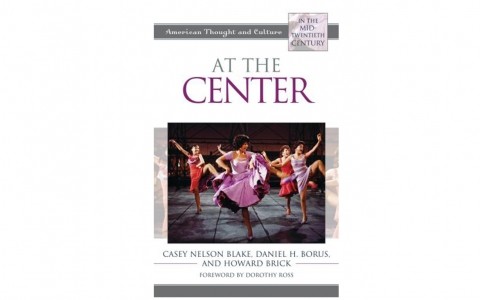Use code 4F20ATC to save 50% on At the Center: American Thought and Culture in the Mid-Twentieth Century!
Order at www.rowman.com or call toll free: 800-462-6420. Offer expires 12/1/20. (*Discount cannot be combined with any other special offers and only applies to purchases made directly from R&L. Print and eBooks cannot be combined in the same order. eBooks can only be ordered online, and are currently sold individually.)
About the Authors:
Casey Nelson Blake, Professor of History and Mendelson Family Professor of American Studies at Columbia University, works on modern U.S. intellectual and cultural history, with an emphasis on the relationship between artistic modernism, cultural criticism and democratic citizenship. His publications include Beloved Community: The Cultural Criticism of Randolph Bourne, Van Wyck Brooks, Waldo Frank, and Lewis Mumford, The Arts of Democracy: Art, Public Culture, and the State, and The Armory Show at 100: Modernism and Revolution.
Daniel H. Borus, Professor Emeritus of History at the University of Virgina, studies how Americans forged cultural and intellectual responses to a social life shaped by a dynamic capitalism. His publications include Twentieth-Century Multiplicity: American Thought and Culture, 1900 − 1920, with explored the ways in which many Americans at the beginning of the twentieth-century rejected or could not accept the validity of long-standing unifying synthesis.
Howard Brick is Louis Evans Chair in U.S. History, University of Michigan. His publications include Transcending Capitalism: Visions of a New Society in Modern American Thought and Age of Contradiction: American Thought & Culture in the 1960s.
About the Speakers:
James T. Kloppenberg, Charles Warren Professor of American History at Harvard University, teaches courses on American and European thought, culture, and politics. He has served as chair of the History Department, the graduate program in American Studies, and the undergraduate program in Social Studies. His publications include Toward Democracy: The Struggle for Self-Rule in European and American Thought and Reading Obama: Dreams, Hope, and the American Political Tradition.
Alma Steingart, Assistant Professor of History at Columbia University, researches the interplay between politics and mathematical rationalities. Steingart’s second book manuscript, Accountable Democracy: Mathematical Reasoning and Representative Democracy in America, 1920 to Now, examines how mathematical thought and computing technologies have impacted electoral politics in the United States in the twentieth century.
Ross Posnock is Anna S. Garbedian Professor of the Humanities at Columbia University. His books include Henry James and the Problem of Robert Browning (1985, University of Georgia Press); The Trial of Curiosity: Henry James, William James and the Challenge of Modernity (1991, Oxford UP); Color and Culture: Black Writers and the Making of the Modern Intellectual (1998, Harvard UP); The Cambridge Companion to Ralph Ellison (editor, 2005); and many more. He is currently writing a book about American sophistication and the fear of art in the 1920s, 1950s and now.
Adam Kosto, Professor of History at Columbia University, specializes in the institutional and legal history of medieval Europe, with a focus on Catalonia and the Mediterranean. He is the author of Making Agreements in Medieval Catalonia: Power, Order, and the Written Word, 1000-1200 (Cambridge UP, 2001) and Hostages in the Middle Ages (Oxford UP, 2012), and co-editor of The Experience of Power in Medieval Europe, 950-1350 (Ashgate, 2005), Charters, Cartularies, and Archives: The Preservation and Transmission of Documents in the Medieval West (PIMS, 2002), and Documentary Practices and the Laity in the Early Middle Ages (Cambridge UP, 2012).

